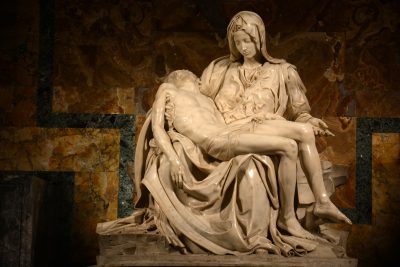 Julian of Norwich was an English visionary, an extraordinarily brave and creative woman, a spiritual counselor, and author who lived mostly in solitude. She was an anchoress, a holy woman associated with and supported by a parsonage. Julian lived alone in a small room in Conisford near the church of St. Julian and St. Edward, which was associated with a Benedictine community at Carrow. Julian loved Jesus Christ as the human face of the Trinity, and she was among those medieval writers whose prayer included vivid imaginings of Jesus’ life, ministry, death, and resurrection.
Julian of Norwich was an English visionary, an extraordinarily brave and creative woman, a spiritual counselor, and author who lived mostly in solitude. She was an anchoress, a holy woman associated with and supported by a parsonage. Julian lived alone in a small room in Conisford near the church of St. Julian and St. Edward, which was associated with a Benedictine community at Carrow. Julian loved Jesus Christ as the human face of the Trinity, and she was among those medieval writers whose prayer included vivid imaginings of Jesus’ life, ministry, death, and resurrection.
Julian’s major work is variously called by her translators, “Showings,” “Revelations of Divine Love,” or “Revelation of Love.” In this book Julian shares sixteen visions (showings or revelations), all of which assure her that despite the world’s suffering and violence, God is present everywhere, all the time, and that God is good and intends goodness in everything.
Julian’s Revelations are marked by a creative integration and harmonization in the archetype of Christ of all apparent opposites. In Christ, by the grace of the Holy Spirit, we discover a holy transformation of life and death, sorrow and joy, darkness and light. The Risen Christ, as the eternal presence of God in everyone, is himself a harmonious integration of gender, so that Father God is balanced by Christ “our Mother.” Following St. Augustine’s lead almost one thousand years before, Julian understands the Holy Spirit to be a continuing manifestation of the love that eternally flows in the Godhead between the Father and Christ, between the First and Second Persons of the Trinity.
Julian would not be comfortable with a belief that God is separate from human beings or creation. Yes, God is the Creator and we humans are creatures, but God creates everything by birthing us forth from within God’s Self. Thus, we all bear deep in our souls the mark of God’s infinite Presence and Love. Some Christian believers assume that the Holy Spirit wants us to change our embodied personality, to be different and better than we are. But for Julian, we should not strive to become better versions of ourselves. Rather, we should trust who we already are, in Christ. The spirit will help us accept ourselves. Julian writes that
…our natural will is to have God, and God’s good will is to have us, and we can never stop willing or loving until we possess him in the fullness of joy. [author’s emphasis]
Julian would say that our longing to be whole human beings is exactly what God wants for us. The Holy Spirit is what prompts our longing to be free of self-centeredness and fear and to give and receive love. Julian’s consciousness overflows with holy visions that she accepts as gifts of the Holy Spirit. She also acknowledges the need for personal disciplines of prayer and reflection so that we are available to receive these gifts.

Jesus was a man who embodied Christ, like a Mother who embraces all her children, no matter what the quality of their experience in any given moment. She cannot take away our suffering, but She will be with us in our suffering. For Julian, all creatures suffer, and all are sisters and brothers. We do not exist alone, and we never suffer alone, because the Mother connects us all through the activity of the Spirit among us.
For Julian, there is nowhere that we can go where God is not. The abiding, ever present Trinity is revealed by the Spirit to be both Father and Mother:
For the almighty truth of the Trinity is our Father, for he made us and keeps us in him. And the deep wisdom of the Trinity is the Mother, in whom we are enclosed. And the high goodness of the Trinity is our Lord, and in him we are enclosed and he in us. We are enclosed in the Father, and we are enclosed in the Son, and we are enclosed in the Holy Spirit. And the Father is enclosed in us, the Son is enclosed in us, and the Holy Spirit is enclosed in us, almighty, all wisdom and all goodness, one God, one Lord.1
1 Julian of Norwich, Showings, trans. and intro. by Edmund Colledge, O.S.A. and James Walsh, S.J., preface by Jean Leclercq, O.S.B. (New York: Paulist Press, 1978), 285.